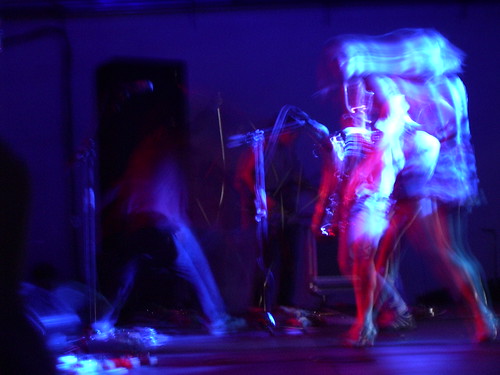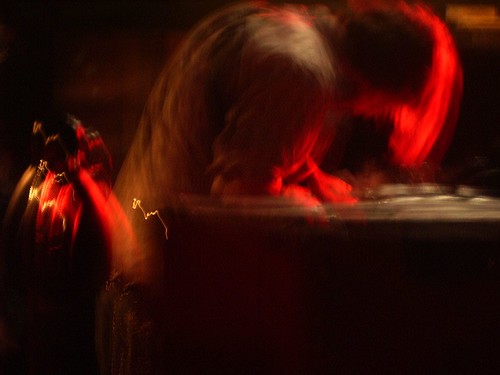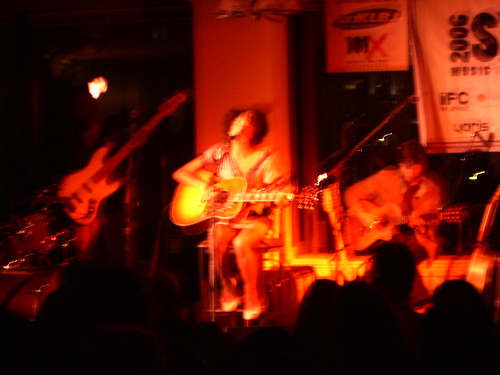Riveted and silent, festival-goers fill every seat and clutter the aisles of Parc Del Forum’s Auditori. Outside, in the blazing Barcelona sunshine, the fifth annual Primavera festival plays host to the neon lunacy of the Flaming Lips, the ear-quaking roar of Mogwai. In this cavernous room, however, illuminated by a single spotlight and armed with only a stool, a microphone and an acoustic guitar, Jose Gonzalez holds his audience spellbound with dextrous finger-picking and a lulling hush of a vocal, conjuring an intimacy reminiscent of Nick Drake.
Those in the audience familiar with Drake’s music possibly discovered him via a 1999 Volkswagen television commercial that used his ‘Pink Moon’ as soundtrack, remarketing the tragically-cultish artist’s back catalogue with startling success. Gonzalez himself is a late-convert.
“It was after one of my first shows, in 1999,” the soft-spoken singer-songwriter explains, shortly after clambering offstage. “Some guys came back afterwards saying, ‘you must have listened to a lot of Nick Drake.’ But I’d never heard him! Since then, that‘s all changed… ‘Pink Moon’ was my point of comparison when recording my debut album ‘Veneer’. Thirty minutes of just vocals and guitars, and it still worked - why shouldn’t it work for me? I don’t really know much about his life - I keep meaning to see that documentary. I’m too lazy with my rock history…”
Famed in his home country of Sweden, Gonzalez was similarly brought to wider attention last year when film-maker Nicolai Fuglsig scored footage of several thousand multi-coloured rubber balls lazily bouncing along a San Francisco street with Jose’s acoustic rendition of ‘Heart Beats’ (originally by eccentric Swedish electro-pop duo The Knife), to advertise Sony’s BRAVIA HDTV line. Taste-making teen-drama The O.C. had already featured Gonzalez on its soundtrack, his ‘Crosses’ scoring the tear-jerking finale of its second season and laying groundwork for success in America.
“It’s all about getting the music heard,” reasons a sanguine Gonzalez. “The companies want your music to sell their products, but they’re also offering a chance to present your music to an audience that would never hear it. There hasn’t been the backlash to the advert that I expected; a Dutch fan sent me a 2-page email, he was really angry. He asked, ‘Would Nick Drake have been applauded if he’d sold his music to an ad company?’
“The thing is, I get a lot of fan-mail via Myspace, people writing that they went out and bought the album after hearing the advert. We released ‘Heart Beats’ as a single,” he adds, proudly, “but people bought the album. It’s about the music, not just one song.”
Parc Del Forum, at the foot of Barcelona’s bustling La Rambla boulevard, is a breath-taking sweep of concrete overlooking the harbour and the sparkling Mediterranean. Wandering about its surrealist sculptures, the Yeahs Yeah Yeahs sound-checking on some distant stage, the bearded, drab-casual Gonzalez blends in with the festival-goers, chatting in Spanish with some fans before switching, with impressive fluency, to Swedish to talk to his manager, and then English for us.
Born to Argentinian parents, Gonzalez grew up in the suburbs of Gothenburg, Sweden, surrounded by other Latin American families. He picked up the guitar aged fourteen, at his father’s urging, inspired by Bossa Nova, The Beatles and Cuban singer-songwriter Silvio Rodriguez.
“There was a summer where I sat down every day for hours a day, teaching myself,” he laughs. “When I get into something I get into something. I learned Spanish classical guitar, which is related to flamenco music, in how hard you hit the strings and the body of the guitar. It’s aggressive, dramatic. I like the drama! [laughs]”
You don’t seem a very aggressive person.
“One of the first interviews I did, I was asked to describe my music, and I said, ‘Aggressive’. And they laughed! I suppose it sounds very mellow, but there’s a degree of aggression to how I play, in the way I feel when I‘m playing.”
In his teens, Jose played bass for Gothenburg punks Back Against The Wall, indie-rockers Only If You Call Me Jonathan, hardcore act Renascence. Creative fulfilment eluded him, however.
“I never felt comfortable making music with anybody else,” he sighs. “People that know me think that I’m private. I’m very protective. Before I can share any idea with someone else, I need to work on it until I feel it’s presentable. That’s why I recorded Veneer at home.”
He began writing the songs that would compose Veneer in 1998, playing guitar alone for hours, discovering the chords and melodies as he went along. The newest song, opener ‘Slow Moves’ was written in 2003. Early sessions were recorded on a 4-track cassette-recorder, before Gonzalez upgraded to a computer loaded with Cubase software. Every track was recorded in his tiny, 21 square metre Gothenburg flat. When Swedish label Imperial Recordings originally released Veneer, in 2003, Gonzalez quit the PhD he was researching in DNA replication in Herpes viruses for his music. Last April, British label Peace Frog released Veneer in the UK, Hidden Agenda repackaging the album for America five months later.
“When I wrote Veneer, I wasn’t considering the audience,” he muses. “A listener, maybe, but not a million of them. It’s different now. Veneer is a really moody, introspective album, so people think I’m moody and introspective. And there’s probably a little truth in there. [chuckles] I faced this in 2003, when my album was released in Sweden - going from nowhere to a Gold album at home was a much bigger deal than making the transition from the success in Sweden, to the success I’ve had internationally. I spent a lot of time thinking it through then, and it was hard.”
The spectre of recording Veneer’s sequel looms large. “I’m pretty sure I want to make another, similar album, and I’m pretty sure people won’t respond like they did to Veneer. If it sells a tenth of the first album, I’m okay with that. I’m amazed so many people liked Veneer; the things I like usually aren’t successful, and the things that are successful I usually can’t stand. Most people’s first albums are their best, anyway,” he says, almost glumly, “the second album is just a self-conscious attempt to repeat what worked first time around. That’s the topic of my song, ‘Deadweight On Velveteen’: ‘Vulgar, when brought to light’.”
The album’s half-written; however, Jose plans to be on the road for the foreseeable future (“I don’t have a girlfriend or a cat anymore, so I don’t mind not coming home for months on end,” he explains), and he can’t write songs on tour. And then there’s the album he’s planning with Junip (post-rock band formed with school friend Elias Araya), his vocal work for downtempo duo Zero 7’s new album, the music he’s recorded for Swedish teen drama Livet enligt Rosa… Those waiting on a second Jose Gonzalez album had better be patient.
“If you ask me what I’ll be doing in a year’s time, I can tell you,” he smiles. “I’ll be on the road. I’m more interested in where I’ll be in five or ten years. I have a plan: I want to record one more solo album, maybe two. And an album with Junip, and maybe a side-project of some kind. So that’s four albums, over five or ten years; that’s enough. And if they all flop, and I get bored, I can always go back to studying Herpes…”
(c) Stevie Chick 2006



No comments:
Post a Comment